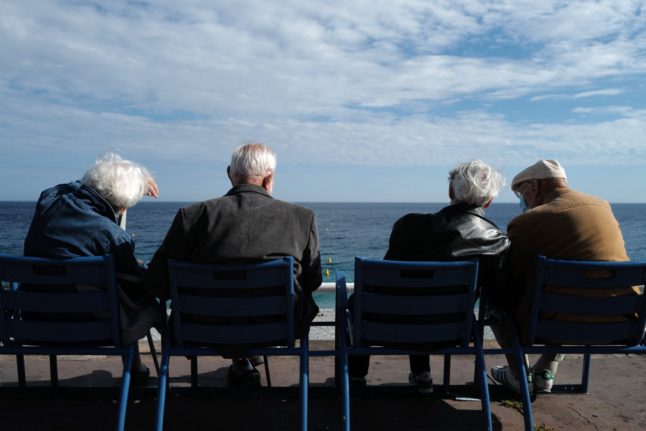What is it?
The programme is called Sortir Plus which translates roughly to ‘Get around more’. It aims to connect older people with a trusted person to accompany them on outings, whether that be going out on a walk, or heading to an appointment with the doctor or hairdresser, or simply going out for a meal.
The companion will be a professional, usually a home-help, and they cannot offer medical services but can provide aid, company and support on trips out.
Who can benefit?
The programme is intended for people over 75 years old who are in a ‘fragile situation’, whether that be due to isolation, age, or mobility challenges.
However, it is only available to those who worked in France in the private sector – in order to qualify, you must receive the supplementary ‘Agirc-Arrco’ pension.
You only need to have worked in France for a minimum period of three months in order to qualify, but it does not apply for former public sector employees, or to people who worked in another country and then retired to France.
What’s the Agirc-Arrco complementary pension?
Basically, France’s pension system offers a ‘base’ regime, which is what most people think of when discussing pensions. It is calculated based on the number of trimestres (quarters) you worked.
Then there is also the ‘complementary’ regime, which works on a points system and depends on your sector. You are automatically signed up to a complementary regime when you start working in France.
READ MORE: Ask the experts: What foreigners living in France need to know about French pensions
The Agirc-Arrco complementary pension represents the vast majority of people who worked in the private sector – public sector employees have a different plan.
Similar to the ‘base’ pension system, you can qualify even if you only worked for a short period of time in France, but the amount paid out would be smaller.
If you worked in France, but you are not sure what type of ‘complementary’ pension you fall under, you can check out the website info-retraite.fr and log in using your social security number (or France Connect).
If you have worked and paid contributions for more than one trimestre in France, you will find an account set up ready for you which shows your years of contributions in France, and what pension you can expect.
The advantage of the French system is that your pension contributions are deducted automatically, even when you change jobs, and the government keeps track of it all via your social security number.
So how do I sign up for ‘Sortir Plus’?
You can start by getting in contact with an adviser by calling the phone number 0 971 090 971. You can call anytime from Monday to Friday between 8.30am and 6.30pm, excluding public holidays.
Try to call at least two days ahead of the activity you want to be accompanied to.
Then, a professional will take stock of your situation and determine whether you qualify for assistance. They will also inform you of the amount of aid you are eligible for.
If you qualify, they will connect you with an approved professional who will come to pick you up at the date and time you requested for your activity. Depending on the situation, they may stay with you or come back to collect you afterwards.
You can also request to have the same person accompany you for future outings. The person you will be matched with is a professional – they will either be an employee of a home help or transport organisation.
If you prefer not to call, you can also do the request online from your personal space on the Agirc-Arrco website.
In terms of cost, you will not need to pay anything out of pocket during your outing (aside from the activity you are doing of course). The transport and accompaniment costs are covered by Agirc-Arrco and are limited to a certain amount each year.
This means that when you call to organise an outing, they will look at the amount available to you and determine if it falls under the yearly maximum.
What if I don’t qualify? Are there alternatives?
France has plenty of services to help older people, and there is a government website dedicated to the various forms of assistance available.
You can also visit your nearest point d’information local to find out about elderly care in your area. Find one in your area by entering your postcode here.
READ MORE: Explained: The help available for older people in France
If you need someone to help with daily tasks, such as meals, personal care and housework you can seek out an aide à domicile (home-help aid).
Depending on where you live, organisations that offer auxiliaires de vie (carer) services may be provided by the mairie, the centre communal d’action sociale (CCAS) or private businesses.
Regardless of who’s providing the services, they have to be accredited by the départemental authorities.
The cost of using these services can be at least partially offset by applying for the means-tested Allocation personnalisée d’autonomie APA à domicile (APA), which is intended to help cover expenses faced by people with reduced autonomy who want to maintain an independent lifestyle, or who live with and are cared for by family members.
APA, available to over-60s, is managed and paid for by the each conseil départemental, which considers each case on its merits, with personalised care plans adapted to individual needs.
If you only need temporary help – for example if you’re recovering after an operation – you may be eligible for aide sociale, although you’ll need a doctor’s prescription. Any required short or long-term care in this case will be paid for via assurance maladie.



 Please whitelist us to continue reading.
Please whitelist us to continue reading.
Member comments